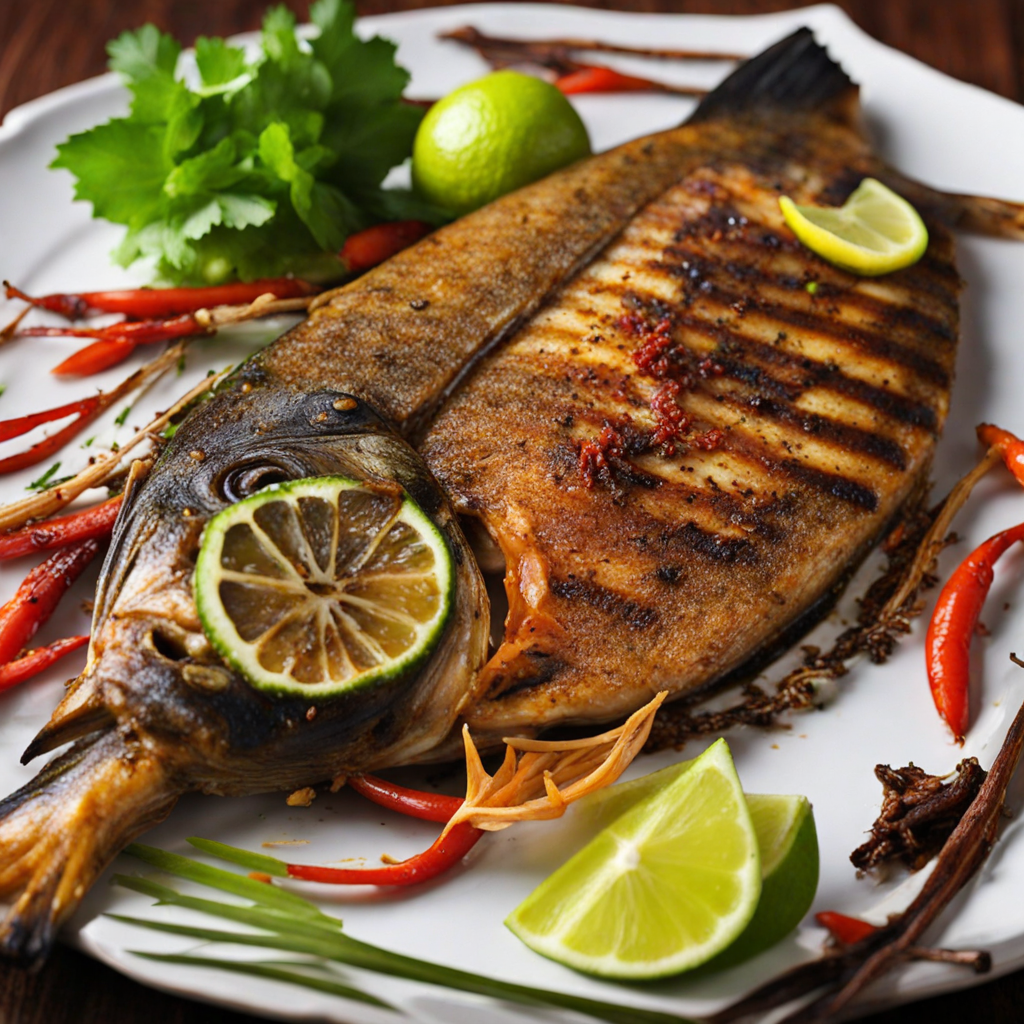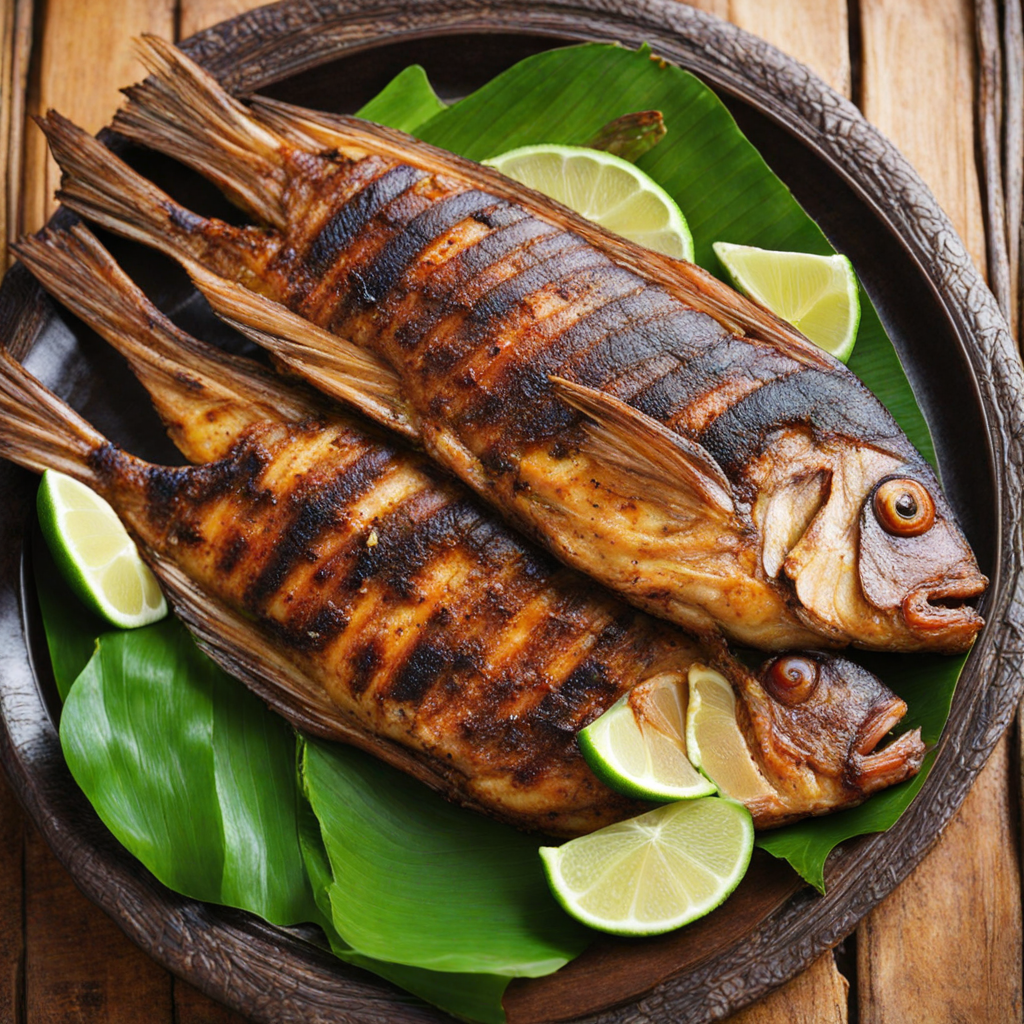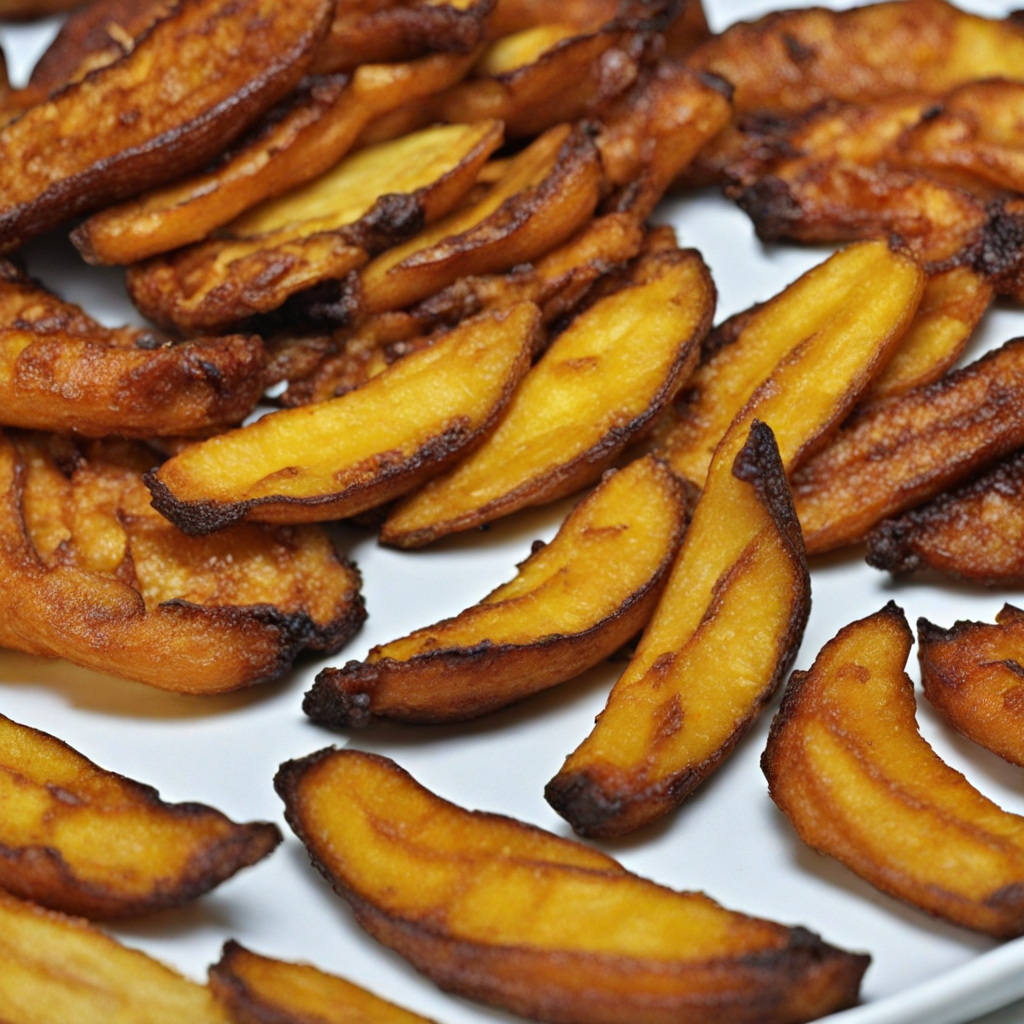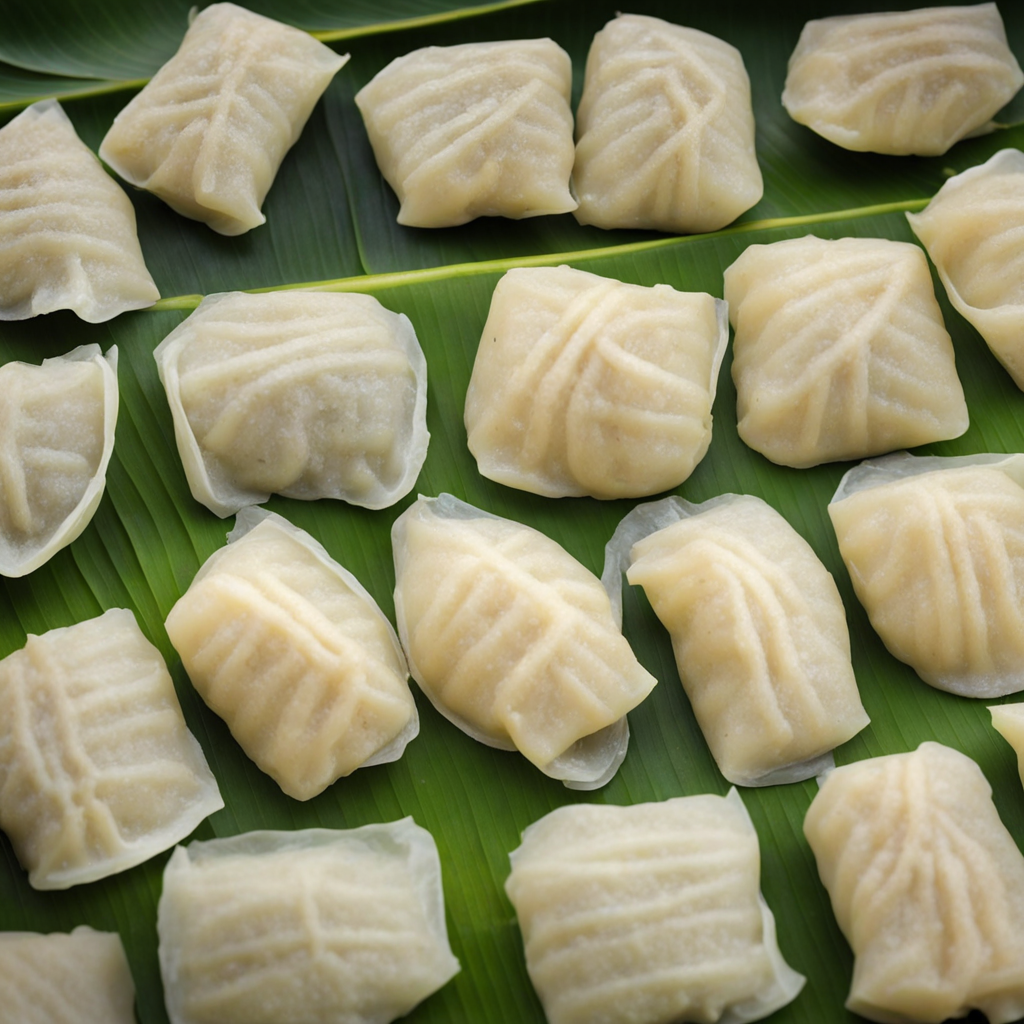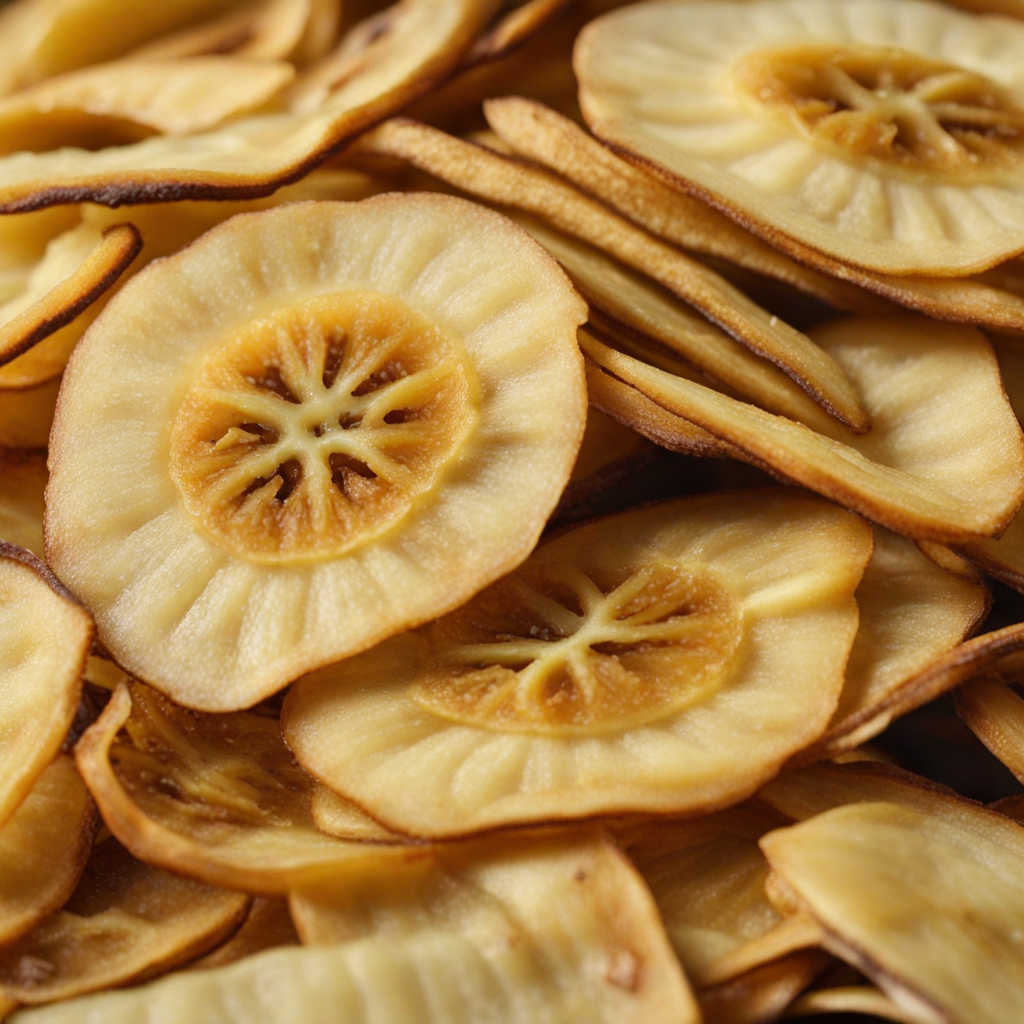Marinated Grilled Fish
Marinated Grilled Fish from Papua New Guinea is a delightful culinary experience that showcases the region's rich marine resources and vibrant flavors. The fish, typically caught fresh from the surrounding waters, is marinated in a blend of local ingredients that may include tangy lime juice, aromatic ginger, and fragrant garlic. This marinade not only enhances the natural sweetness of the fish but also infuses it with a distinct zesty kick that awakens the palate. The combination of spices and herbs used can vary from one region to another, often reflecting the diverse cultural influences and traditions of the local communities. After marination, the fish is grilled to perfection over an open flame, allowing the smoky flavors to penetrate the tender flesh. The grilling process caramelizes the exterior, creating a beautifully charred crust that contrasts with the moist, flaky center. As the fish cooks, the enticing aroma fills the air, drawing diners in and promising a taste that is both comforting and exhilarating. Served with a side of fresh vegetables or traditional starchy sides, this dish becomes a celebration of freshness and simplicity. Each bite of Marinated Grilled Fish transports you to the coastal villages of Papua New Guinea, where the sea meets the land in a harmony of flavors. The dish is often enjoyed as part of communal meals, reflecting the importance of sharing food in Papua New Guinean culture. Accompanied by a refreshing salad or a zesty dipping sauce, the experience is not only about eating but also about connecting with the rich heritage and culinary practices of the region. Whether you’re savoring it on a beachside grill or a cozy home setting, Marinated Grilled Fish offers an unforgettable taste of Papua New Guinea’s culinary treasures.
How It Became This Dish
The History of Fis: A Culinary Tradition of Papua New Guinea Papua New Guinea (PNG), a nation composed of hundreds of islands and a tapestry of cultures, boasts a diverse culinary heritage that reflects its rich history, geography, and social structures. Among its many culinary traditions, Fis stands out as a significant dish that encapsulates the essence of the region's agrarian lifestyle, cultural identity, and communal practices. #### Origins of Fis Fis, often referred to as "fish" in English, is not merely a dish but a cultural symbol deeply woven into the fabric of life in Papua New Guinea. The term "fis" is derived from the Tok Pisin language, one of the country's widely spoken creole languages. The dish typically features local fish, which is often prepared in a variety of ways, including grilling, steaming, or baking. The choice of fish varies by region, depending on what's available in local waters. Popular species include barramundi, snapper, and various freshwater fish from the rivers and lakes. Historically, fishing has been a fundamental part of the subsistence lifestyle in PNG. With its vast coastal lines, rivers, and lakes, the country's indigenous peoples have practiced fishing for millennia. Archaeological evidence suggests that fishing techniques, such as netting and trapping, date back thousands of years. The development of fishing techniques was influenced by the geography of the land, which includes both coastal and highland environments, leading to a rich variety of fishing practices. #### Cultural Significance of Fis In Papua New Guinea, food is intricately linked to social and cultural identity. Fis is more than just a source of sustenance; it plays a crucial role in community gatherings, rituals, and celebrations. Fishing is often a communal activity, bringing families and communities together to share skills, knowledge, and resources. Traditionally, fishing expeditions are accompanied by rituals and prayers, invoking the spirits of the sea and the ancestors to ensure a bountiful catch. Fishermen often employ traditional methods, which are passed down through generations. These methods include the use of handmade nets, traps, and spears, demonstrating a deep respect for nature and sustainable practices. The preparation of fis is also a communal affair, often involving the entire family. Women and children may assist in cleaning, seasoning, and cooking the fish, while men focus on the catch. This cooperative spirit fosters a strong sense of community and reinforces familial bonds. Moreover, fis is often featured in important cultural ceremonies, including weddings, feasts, and rituals that mark significant life events. Its presence at these gatherings symbolizes sharing, unity, and respect for the resources provided by the land and sea. In some cultures, specific fish species are reserved for ceremonial occasions, highlighting their cultural and spiritual significance. #### Development Over Time As Papua New Guinea has modernized, the preparation and consumption of fis have evolved, yet its cultural importance remains intact. In the past, fis was primarily prepared using traditional methods over open fires or in earth ovens (known locally as "mumu"). Fish would be wrapped in banana leaves, seasoned with local spices, and cooked with root vegetables like taro and sweet potato, showcasing the region's agricultural bounty. With the introduction of Western culinary influences, especially during the colonial period, new cooking methods and ingredients began to permeate PNG's culinary landscape. The advent of modern kitchen appliances, such as stoves and refrigerators, has allowed for greater experimentation with fis. Western-style cooking techniques, such as frying and grilling, have been adapted to incorporate local flavors, resulting in a fusion of traditional and contemporary culinary practices. In urban areas, fis has also found its place in restaurants and markets, appealing to both locals and tourists. Street vendors often sell grilled fis, seasoned with a mix of local spices and served with fresh vegetables or rice. This accessibility has helped to popularize fis beyond its traditional boundaries, introducing it to a wider audience. Despite modernization, many communities continue to prioritize traditional fishing methods and recipes. The resurgence of interest in indigenous food practices has led to a revival of traditional dishes, with younger generations seeking to reconnect with their culinary heritage. Community initiatives promote sustainable fishing practices and the use of local ingredients, ensuring that the cultural significance of fis is preserved for future generations. #### Challenges and Resilience The journey of fis has not been without challenges. Environmental changes, overfishing, and climate change pose significant threats to fish populations and the livelihoods of those who depend on them. Coastal communities are increasingly affected by rising sea levels and changing oceanic conditions, leading to a decline in traditional fishing practices. In response, many communities are advocating for sustainable practices and conservation efforts to protect both their food sources and cultural heritage. Additionally, the globalization of food systems has led to an influx of processed foods, which can overshadow traditional dishes like fis. However, there has been a growing movement within PNG to reclaim and celebrate traditional foods. Initiatives aimed at educating the younger generation about the value of indigenous culinary practices have gained traction, fostering a renewed appreciation for local dishes. #### Conclusion Fis is more than just a meal; it is a vital part of Papua New Guinea's cultural identity, encapsulating the values of community, sustainability, and respect for nature. Its evolution reflects the complexities of a society that is navigating modernization while striving to preserve its rich heritage. As PNG continues to face environmental and social challenges, the resilience of its culinary traditions, embodied in dishes like fis, will play a crucial role in fostering cultural pride and ensuring the survival of its gastronomic legacy for generations to come.
You may like
Discover local flavors from Papua New Guinea


